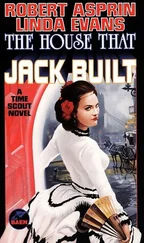O. Douglas - The House That is Our Own
Здесь есть возможность читать онлайн «O. Douglas - The House That is Our Own» — ознакомительный отрывок электронной книги совершенно бесплатно, а после прочтения отрывка купить полную версию. В некоторых случаях можно слушать аудио, скачать через торрент в формате fb2 и присутствует краткое содержание. Жанр: unrecognised, на английском языке. Описание произведения, (предисловие) а так же отзывы посетителей доступны на портале библиотеки ЛибКат.
- Название:The House That is Our Own
- Автор:
- Жанр:
- Год:неизвестен
- ISBN:нет данных
- Рейтинг книги:3 / 5. Голосов: 1
-
Избранное:Добавить в избранное
- Отзывы:
-
Ваша оценка:
- 60
- 1
- 2
- 3
- 4
- 5
The House That is Our Own: краткое содержание, описание и аннотация
Предлагаем к чтению аннотацию, описание, краткое содержание или предисловие (зависит от того, что написал сам автор книги «The House That is Our Own»). Если вы не нашли необходимую информацию о книге — напишите в комментариях, мы постараемся отыскать её.
The House That is Our Own — читать онлайн ознакомительный отрывок
Ниже представлен текст книги, разбитый по страницам. Система сохранения места последней прочитанной страницы, позволяет с удобством читать онлайн бесплатно книгу «The House That is Our Own», без необходимости каждый раз заново искать на чём Вы остановились. Поставьте закладку, и сможете в любой момент перейти на страницу, на которой закончили чтение.
Интервал:
Закладка:
She said, “Once the chairs and cushions have been thoroughly well beaten, and the cabinets and tables and so on washed and polished, you’ll begin to recognise them as your own. I can see you’ve a lot of most desirable things. I’m quite looking forward to seeing them adorn the flat. And they’re really in wonderfully good condition. I heard such stories about storing that I sold most of my things. When I see yours I wish I hadn’t, though mine perhaps were not worth keeping—solid, ugly Victorian stuff.”
As Isobel watched Kitty moving from one piece of furniture to another, as if greeting familiar friends, she knew how sad her heart must be seeing again the inanimate things that had been part of her happy married life. She knew, also, that it is not wise to allow oneself to indulge in unavailing regrets, so, after a little, she suggested that Kitty should tell the people in the warehouse that the furniture would be required shortly, and give directions about having carpets and rugs beaten, and curtains sent to be cleaned.
“You don’t want dirty things brought into your clean flat.”
“No,” said Kitty, still held by the past. “No. And I suppose they are dirty. Everything was bundled away in a hurry. I didn’t care at the time if I never saw them again. I’ve hardly ever thought of the poor things, and here they are, patiently waiting for me. Now I’m longing to have them all about me. And my books! I’ll enjoy putting them all back on their shelves, and reading bits out of one and another.”
“At that rate,” said Isobel, “you won’t get on very fast, but it won’t matter. Why should one be in a hurry getting into order when it’s such a pleasant process? Well, don’t you think you’ve done enough for one day? I think tea, and a rest before dinner, are indicated. You go at things with such force, my dear, that you wear yourself out.”
CHAPTER IV
Table of Contents
A blessed thing it is for any man or woman to have a
friend, one whom we can trust utterly, who knows
the best and the worst of us, and who loves us just
the same.—Charles Kingsley
A new interest is a tonic, not only to the mind but the body, and it amazed Isobel Logan to see how the flat and its concerns made a new woman of her friend. Time, doubtless, had been at its healing work, she had been ready to emerge from the dark cloud, and it only needed the stimulating thought of a home of her own to give her back something of the joy of life that had once been hers.
She was now full of plans, and Isobel was there to encourage her in all her projects. With truth Isobel declared that she enjoyed it all immensely. Her life was not so full but that she was glad of a fresh interest, nor were her friends so numerous that she could afford to undervalue one who needed her.
While the plumbers and the painters were in the flat, the two friends worked busily, making curtains and new slips for cushions, and looking over household linen.
“You must remember,” Kitty said, “that I was married sixteen years, and though I always renewed my stock at the spring sales, the life of linen in a laundry is not a long one. I’d clean forgotten what I possessed. Look at that tea-cloth with the deep crochet border. It was given me by a woman I was able to help, at least, Rob got things put right about her pension—her husband was killed in the War—and whose family we took an interest in. I must try to find out what has become of her. I’ve lost trace completely of so many people. My own fault too, for our friends did their very best, writing, and even offering to come out, but we didn’t want them, and after a time I didn’t even answer their letters. There was nothing to say, no progress to report, and gradually, they got discouraged and dropped off.”
“Wasn’t that a pity?” Isobel asked. “Good friends aren’t lying about for the picking up. But I don’t wonder you gave up writing—the world to you was narrowed down to one sick man. You were living for him, and had no thought or interest to spare for outsiders. But you’ll have to try now to remake your world. You’re naturally sociable; you really like people.”
Kitty admitted she did. “Both Rob and I liked our fellow-men and we entertained a good deal in a very modest way. I would like to try to pick up some of the threads again. A lot of kind letters were sent to the old Hampstead address when Mr. Johnson put the notice of the death in the papers, but I hardly looked at them, and only a formal note of thanks was sent. I ought to have replied to each one myself. It would have given me something to do. I can see now how feeble it was to give way as I did. Other women lose their husbands and have to go out into the world to earn their living. It’s good to have to make an effort, and bad to have time to nurse one’s grief.”
“Remember,” said Isobel, “how tired you were, and over-strained. Two years of nursing and constant anxiety would wear out anyone. I think you were very brave, coming to an hotel among strangers and making no fuss.”
Kitty looked at her tall friend, and said:
“You sit there and sew placidly at my cushions, saying kind things to me that I don’t in the least deserve. How you could have been so patient with me I don’t know, but, anyway, it was you who helped me to my feet, and every day now I am getting more able to walk alone.”
“Well, don’t walk away too far; I don’t want to lose you. . . . Have you thought over the question of Mrs. Auchinvole?”
Kitty took the scissors from Isobel’s lap, snipped a thread and said:
“I should think I have thought. There’s a lot in her favour. She’s decent, I’m sure of that, it’s written on her face. And in a way it would be an advantage to have a relative of the Gordons (though that might work two ways), but——”
“It seems to me,” said Isobel, “that the thing that matters most is whether you like her personally. I don’t think you could live in a house with another woman without a certain degree of friendship. A servant to you would always be more than just a person who did your cooking and cleaning, she’d be a human being in whom you were interested.”
“Yes, but that’s just the point. I quite like Mrs. Auchinvole, but I’m afraid she hardly understands that I don’t want so much a sympathetic friend as one who will keep the flat clean, cook and wait a decent meal. There is too much of the we-are-widows-together touch about her for me.”
Isobel laughed, and presently asked, “Did you manage to broach the subject of uniform?”
“No,” Kitty confessed, “I did not. But broach it I must. Prints in the morning, and a decent dark dress in the afternoon, I insist on, but I’m a little afraid that the widow of Andrew Auchinvole may feel herself insulted by the suggestion. I don’t know, though Gordon tells me she was a housemaid before she married, so she may have a cap and apron in her disposition.”
“Let’s hope so,” said Isobel; “I like her face, and her Aberdeen voice. She would give a sort of tone to the flat, go well with the family portraits, and the Georgian silver, and the wild geese.”
“Would she, d’you think? I’d certainly be very thankful to have one whose antecedents I knew something of. I don’t really think she can cook much, but an intelligent person (and all Aberdonians are intelligent) can do a lot with a cookery-book. She might even have some lessons. You know I’ve to see her to-day? I gave her a fortnight to think it over.”
“She’ll be wise to come to you,” Isobel said. “Couldn’t you call her a housekeeper? It’s a down-come in a way, for a woman who’s had a house of her own, to come back to domestic service, and I’d always address her as ‘Mrs. Auchinvole.’ ”
Читать дальшеИнтервал:
Закладка:
Похожие книги на «The House That is Our Own»
Представляем Вашему вниманию похожие книги на «The House That is Our Own» списком для выбора. Мы отобрали схожую по названию и смыслу литературу в надежде предоставить читателям больше вариантов отыскать новые, интересные, ещё непрочитанные произведения.
Обсуждение, отзывы о книге «The House That is Our Own» и просто собственные мнения читателей. Оставьте ваши комментарии, напишите, что Вы думаете о произведении, его смысле или главных героях. Укажите что конкретно понравилось, а что нет, и почему Вы так считаете.




![Альфред Ван Вогт - Вечный дом / The House that Stood Still [= А дом стоит себе спокойно…; Обитель вечности]](/books/276568/alfred-van-vogt-vechnyj-dom-the-house-that-stood-thumb.webp)







